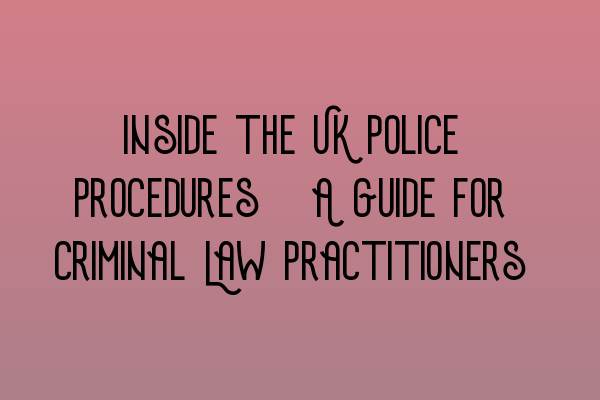Inside the UK Police Procedures: A Guide for Criminal Law Practitioners
As a criminal law practitioner in the UK, it is essential to have a thorough understanding of the police procedures followed in criminal investigations. Having this knowledge will not only enable you to provide effective representation to your clients but also navigate the legal system with confidence. In this article, we will guide you through the various aspects of UK police procedures that you should be familiar with.
Arrest Procedures
When it comes to arrests, the police must follow specific guidelines to ensure compliance with the law. Understanding these procedures is crucial in assessing the legality of an arrest and protecting your client’s rights. From the initial grounds for arrest to the cautioning process, we will delve into the intricate details of arrest procedures in the UK.
Interview Process
Once a suspect is arrested, the interview process plays a vital role in gathering evidence and determining guilt or innocence. As a criminal law practitioner, it is essential to understand how the interview process unfolds, the rights of the suspect, and the rules surrounding the admissibility of statements made during the interview. We will explore these aspects in detail to equip you with the knowledge needed to protect your client’s best interests.
Evidence Gathering and Preservation
The collection and preservation of evidence is a critical stage in any criminal investigation. The police have a duty to gather evidence in a fair and unbiased manner. It is crucial for criminal law practitioners to understand the procedures used by the police to collect evidence, including search warrants, forensic examinations, and the handling of potentially sensitive information. Our comprehensive guide will provide you with the insights you need to evaluate the admissibility and reliability of the evidence presented.
Charging Decisions and Court Proceedings
After the police investigation is complete, charging decisions are made based on the evidence gathered. Understanding how these decisions are made and the factors considered by the Crown Prosecution Service (CPS) is crucial in anticipating the outcome of a case. We will also discuss the court proceedings that follow, including bail applications, pre-trial procedures, and trial preparation.
Conclusion
This comprehensive guide provides a detailed overview of the UK police procedures that criminal law practitioners need to be familiar with. By understanding the intricacies of these procedures, you can effectively represent your clients and navigate the legal system with confidence.
